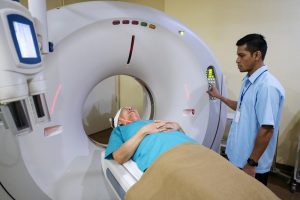
Chest CT scans are more efficient than lab tests in confirming 2019 novel coronavirus (COVID-19) diagnoses, according to a new study out of Wuhan, China.
Encompassing more than 1,000 patients, the assessment deemed CT to be the primary screening tool for COVID-19. Finding such a tool that can make early diagnoses is high in importance, as without specific therapeutic drugs or vaccines for the virus, identifying and isolating infected patients from the healthy population fast is essential.
“Early diagnosis of COVID-19 is crucial for disease treatment and control,” wrote the researchers. “Compared to RT-PCR, chest CT imaging may be a more reliable, practical and rapid method to diagnose and assess COVID-19, especially in the epidemic area.”
The Chinese government only began recognizing CT diagnoses for the coronavirus in February, having initially only recognized those confirmed by reverse-transcription polymerase chain reaction (RT-PCR) or gene sequencing for respiratory or blood specimens. Such tests are limited in sample collection, transportation and kit performance, with the total positive rate of RT-PCR for throat swab samples about 30%-60% at initial presentation. The low sensitivity of RT-PCR indicates that a large number of COVID-19 patients will not be identified quickly and receive appropriate treatment, creating the risk of the virus spreading to a larger population.
Evaluating 1,014 patients who underwent chest CT and RT-PCR tests, the researchers found that 888 (88%) had positive CT results, compared to 601 patients (59%) with positive RT-PCR results. The sensitivity of chest CTs that suggested the presence of the virus was 97 percent for cases that had positive RT-PRC results. For those with negative results, 75% had positive scans, of which 48% were ranked as highly likely cases and 33% as probable.
By analysis of serial RT-PCR assays and CT scans, the interval between the initial negative to positive RT-PCR results was four to eight days.
“About 81% of the patients with negative RT-PCR results but positive chest CT scans were reclassified as highly likely or probable cases with COVID-19, by the comprehensive analysis of clinical symptoms, typical CT manifestations and dynamic CT follow-ups,” said the authors.
Since the outbreak, numerous manufacturers have each donated millions of dollars in CT scanners and other equipment to help standard and makeshift hospitals diagnose patients quickly. Among them are Siemens, GE, Canon, United Imaging Healthcare and Philips.
In addition, Chinese and American researchers have collaborated together to create a special report to educate radiologists what signs to look for on CT scans when examining patients suspected of carrying the disease.
The findings were published in the journal, Radiology.